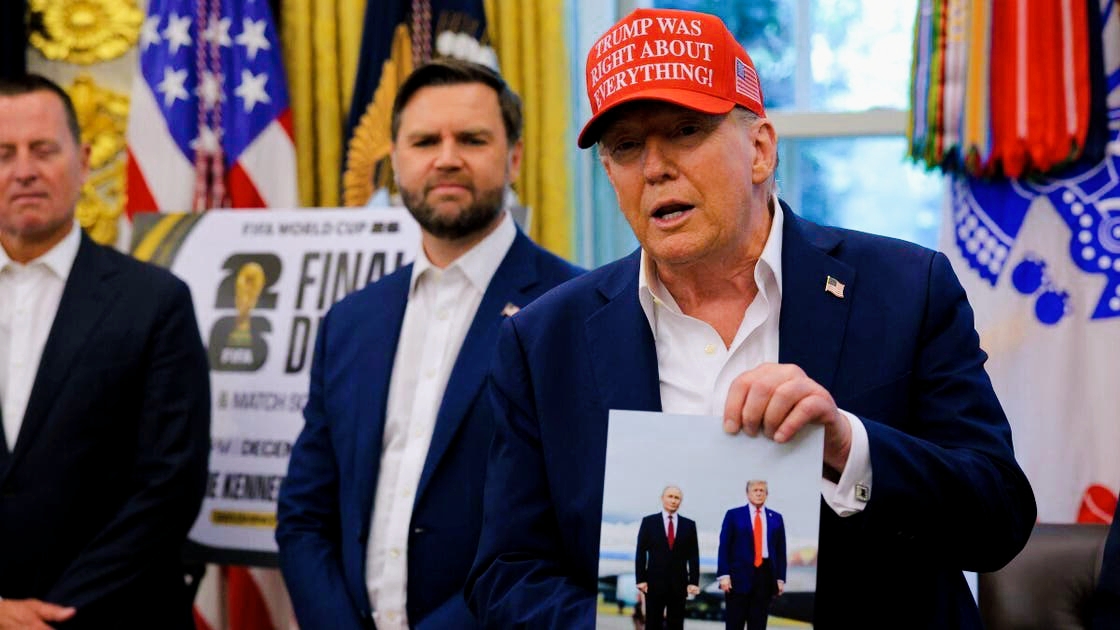Cancellation of the Trump-Putin Summit Amid Rising U.S. Sanctions on Russia

* Cancellation of the Summit Between Trump and Putin
U.S. President Donald Trump announced yesterday, Wednesday, the cancellation of a summit that was scheduled to be held with Russian President Vladimir Putin, attributing this to a lack of progress in diplomatic efforts and his feeling that the timing was not right.
Trump told reporters at the White House, "We canceled the meeting with President Putin; I didn't feel it was appropriate."
He added:
"I didn't feel we would reach the desired goal. So I canceled it, but we will do it in the future."
Trump expressed his frustration with the stalled negotiations. He said, "Honestly, all I can say is that every time I talk to Vladimir, I have good conversations, and then they yield no results."
* New U.S. Sanctions on Russia
The cancellation of the summit came at a time when the White House announced new sanctions targeting Russian oil exports as part of broader efforts to pressure Moscow due to its ongoing military operations in Ukraine.
Trump expressed hope that these measures would be temporary and would make Putin "rational."
U.S. Treasury Secretary Scott Pisent announced on Wednesday new sanctions on the two largest oil companies in Russia and condemned Moscow's refusal to end the "senseless war."
The sanctions target Rosneft and Lukoil, in addition to dozens of their subsidiaries, following months of bipartisan pressure on President Donald Trump to impose tougher sanctions on the Russian oil sector.
* Statements from the U.S. Treasury
Pisent stated in a statement: "It is time to stop the killing and reach an immediate ceasefire."
He added that given Russian President Vladimir Putin's refusal to "end this senseless war, the Treasury Department is imposing sanctions on the two largest oil companies funding the Kremlin's war machine."
Pisent noted that the Treasury is prepared to take further action if necessary to support President Trump's efforts to end the war, saying: "We urge our allies to join us and commit to these sanctions."
* Ambiguity Surrounding the Budapest Summit
While an atmosphere of ambiguity surrounded the anticipated summit in Hungary between U.S. President Donald Trump and his Russian counterpart Vladimir Putin, especially after Trump announced its "temporary" cancellation, U.S. Secretary of State Marco Rubio clarified that the United States still wants to meet and engage in dialogue with Russia, despite the U.S. administration imposing new sanctions on Moscow just hours before due to its war in Ukraine.
Rubio told reporters yesterday evening, "We still want to meet with the Russians... We will always be interested in dialogue if there is a possibility of achieving peace."
* Hungary's Position on the Summit
For his part, Hungarian Foreign Minister Peter Szijjarto confirmed that "the United States has not backed down from holding the Budapest peace summit."
He said in a tweet on his X platform:
"Bad news for the war-supporting lobby, and good news for those who want peace. After my meeting with the U.S. Secretary of State, it became clear that the United States has not backed down from holding the Budapest peace summit."
He also emphasized that preparations for that summit are still ongoing, clarifying that the intention is there, but discussions are ongoing regarding the timing only.
* Trump's Statements on Negotiations
This came after the U.S. President announced that he does not want "fruitless" negotiations with his Russian counterpart that would be "a waste of time."
* Continuation of Russian Preparations
And despite the summit being postponed indefinitely, Russian Deputy Foreign Minister Sergey Ryabkov confirmed yesterday that preparations for it are "ongoing."
For his part, Kremlin spokesman Dmitry Peskov stated that "the deadlines for the summit have not yet been determined," adding that the matter requires "careful preparation."
* Dispute Over Ukrainian Territories
Meanwhile, U.S. media reports indicated that the problem lies in the issue of the regions that Moscow demands Kyiv to concede.
Putin had demanded during his call last week with Trump that Kyiv concede the "Donbas" region, according to U.S. media reports.
While the U.S. President later clarified that the Russian President "cannot have everything."
Ukrainian President Volodymyr Zelensky described Trump's proposal to negotiate with Russia based on the current contact lines as "a good compromise."